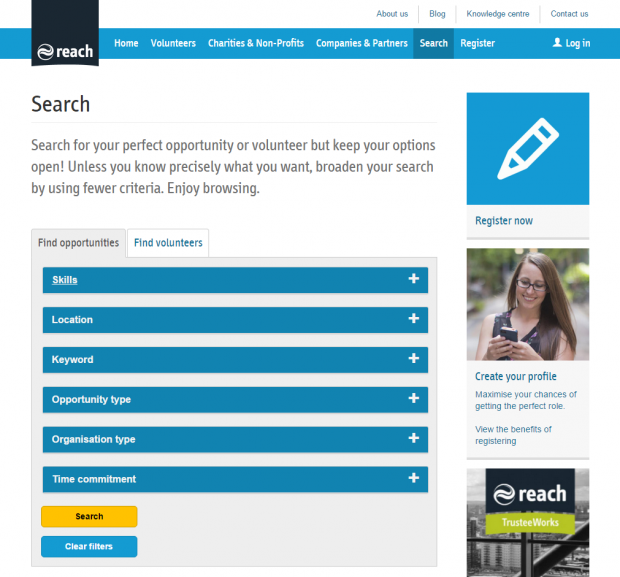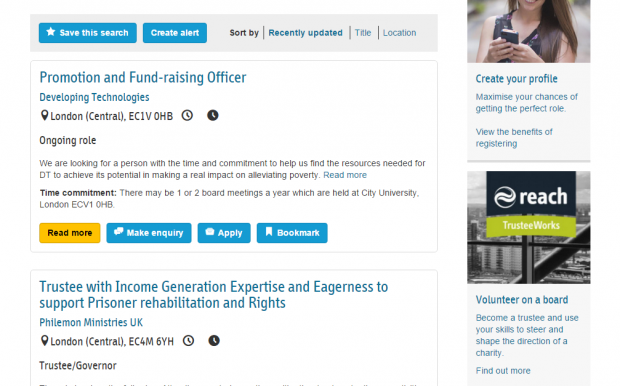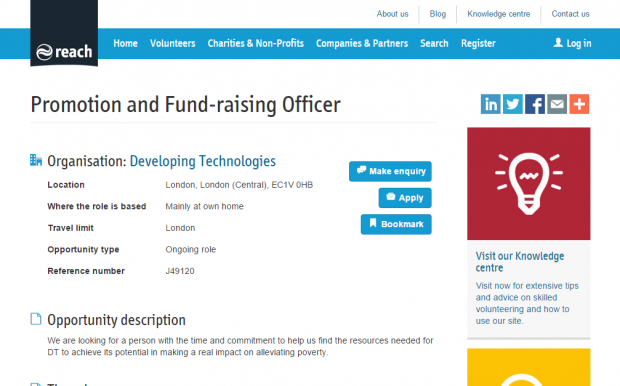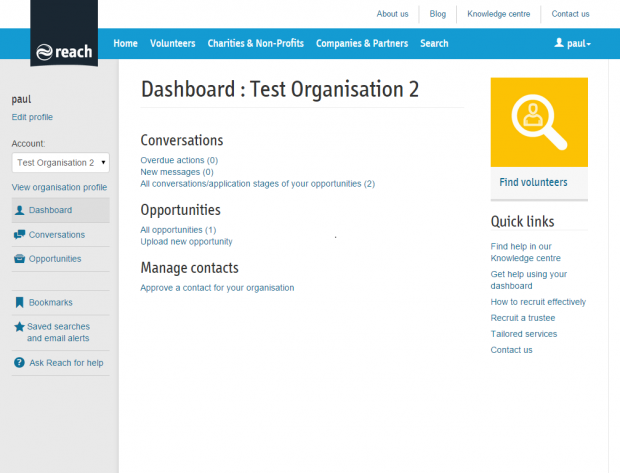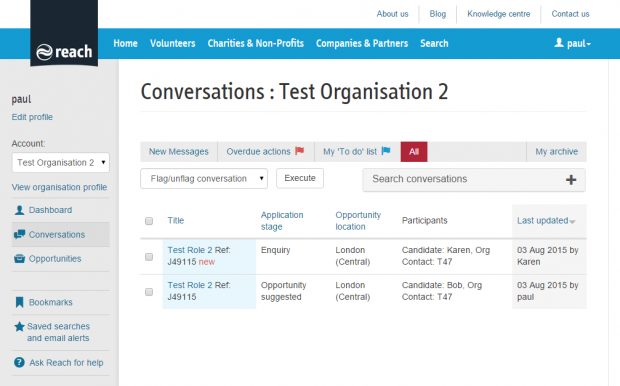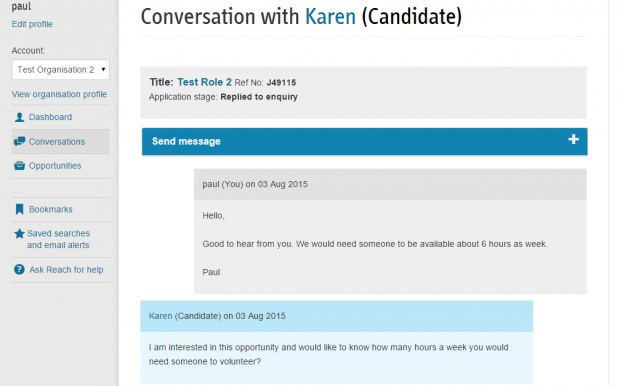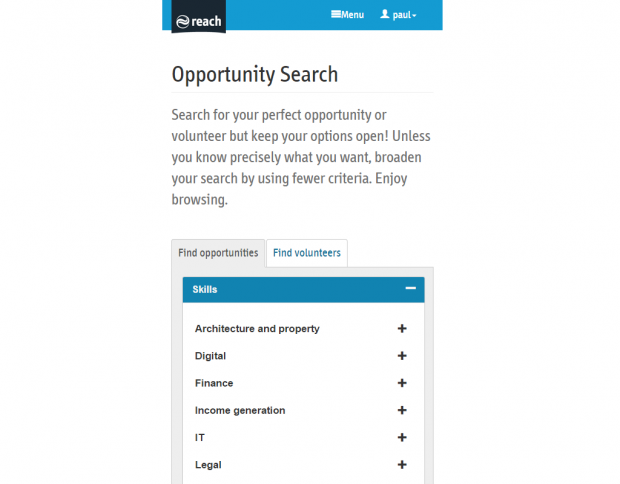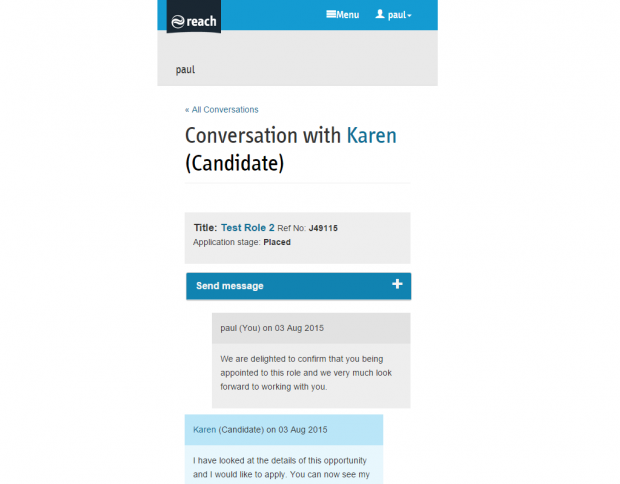 Support for Drupal 7 is ending on 5 January 2025—it’s time to migrate to Drupal 10! Learn about the many benefits of Drupal 10 and find migration tools in our resource center.
Support for Drupal 7 is ending on 5 January 2025—it’s time to migrate to Drupal 10! Learn about the many benefits of Drupal 10 and find migration tools in our resource center.The site was designed to increase Reach’s digital presence and move their workflows online. By doing so users would be able to perform more actions themselves, enabling faster interactions as well as focusing the Reach team efforts on other areas of the activity. Essentially a ‘match.com’ for volunteers and charities, the new platform would allow skilled volunteers to engage with the right charities, creating valuable opportunities for skills sharing, recruitment and making a positive impact in the volunteering community.
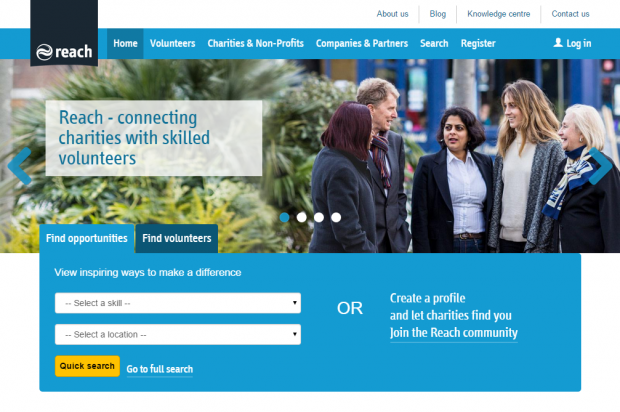
The site will be used to bring a community of volunteers and charities together, increasing communication between them by bringing conversations online. Due to Drupal’s granular permission system, ability to scale and the easy creation of user profiles and content, Drupal was a clear choice for this new platform to build upon the client's existing success and drive it further.
The goals
The goal of this project was to enable volunteers and organisations to interact with each other, giving them the power to create and complete their user profiles and applications independently of Reach. The new site will allow volunteers to search compatible volunteering opportunities and discuss them with the organisation directly.
Organisations themselves would be able to post new opportunities which they could suggest to selected volunteers, increasing direct interaction and communication between the two parties.
The aim of this was to increase the number of expressions of interest and applications made between organisations and volunteers, creating a larger community with an interest in making a positive impact.
The challenge
The biggest challenge of this project was taking a business flow that had been largely manual and re-designing it for the web. Particular attention had to be paid to defining the interdependencies between parts of the process, as well as internal terminology used throughout the process. As with any digitisation or a workflow, existing process and conventions were re-examined and discussed frequently to ensure the final product was not only fit for purpose, but also future proofed.
Replacing paper forms and allowing users to register as volunteers and organisations whilst still being able to maintain the vetting process required by Reach meant a great deal of thought went into user navigation, registration and approval processes. Some fields needed hiding from front end users or re-labelling, allowing Reach users to edit later to add the additional details. This allowed users to enter information in a friendly way as possible whilst still maintaining the level of detail and criteria Reach needed for its internal processes and reporting.
Applications
The biggest part of this project, and the most complex, was the application system itself. We created a way for organisation contacts and volunteers to communicate, but also allow Reach to track applications and report on the progress throughout.
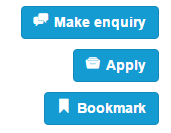
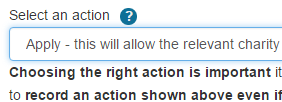
The solution was to use a node type and allow comments to be the conversation between the two, with each comment updating the application status workflow if needed. Alongside this, workflow was used to manage the application status progression, limiting options to only those selected within the CMS depending on the user and current application state. The addition of being able to change the label depending on the previous state meant that Reach could retain granular control over application processes and flow but users were able to select the application state and continue conversations themselves.
To ensure applications are processed and updated accordingly, the rules module was used to mark conversations as ‘overdue’ and send reminder at set times throughout the process if a set amount of time passed. This ensured data was stored accurately throughout the system meaning that statistics and data collected by Reach were accurate.
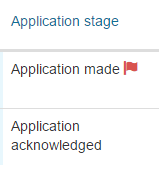
Some opportunities on the platform are marked as ‘premium’, where a small charge may be applied and the management and sourcing of volunteers is completed entirely by Reach. This meant that for some published opportunities on the site applications had to be between Reach and volunteers rather than volunteers and organisation contacts. Building this in added one final layer of complexity to the process to ensure conversations went to the right person based on the opportunity being applied for.
Once volunteers had applied for an opportunity, organisation contacts then had access to more profile information including access to any uploaded CVs and additional work details. Additional work was done to ensure conversations were secure and controlled by Drupal’s permission system, allowing contacts from organisations to pass on opportunities and conversations to other people within the organisation if needed.
Dashboards
Every user on the site, both volunteers and organisations contacts, were given their own dashboard. This summarised the number of opportunities they had uploaded or applied for and highlighted any important actions they needed to take. Additional dashboard pages held their saved searches and bookmarked users/opportunities.
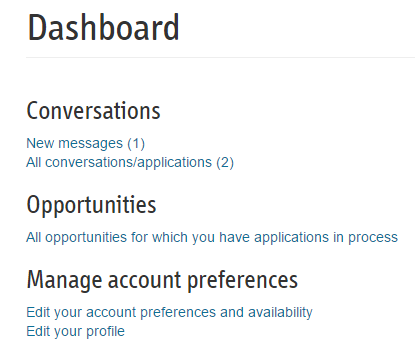
An application dashboard showed all their conversations with volunteers/organisations/Reach, allowing them to filter by title, application stage and participants.
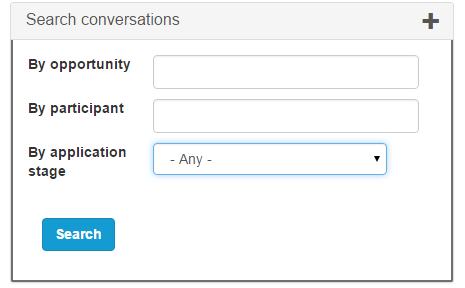
Reach Users
Alongside the volunteers and organisations on the system, we had to create a way for Reach users to manage their premium services and maintain their management over the platform. To solve this Reach users were given administration workbenches to managing the vetting of volunteers, organisations and opportunities, giving them an easy way to search and access the site users and content.
The conversations workbench meant Reach users could have a quick overview of ongoing applications and manage their premium applications.
To add to the general management they were given the ability to automatically filter opportunities and volunteers from a volunteer or opportunity profile page, allowing them to send multiple suggestions from once place to aid existing users and increase communication between the two groups of people.
The Results
As a result, Reach staff now have a fully digital system for managing their users, organisations and applications. Users now have the power to update their profiles and opportunities as they want to rather than contacting Reach directly, saving both time and effort.
This ensures Reach can use the new site to maintaining their reporting system and statistics, allowing them to more easily measure the use and success of the system. The combination of these things will enable Reach to become more efficient in their day to day management, allowing them to focus on growing their organisation and continuing their impressive record to date.
Technical specifications
Organic groups was used for the creation of organisations that could post volunteering opportunities to the site. The built in permission handling for this situation was perfect for this use case. The use of comment alter allowed an application to be updated by commenting on it, creating a conversation between a volunteer and an organisation.
Rules was used throughout the site, setting reminders and performing actions on applications as needed.
The workflow module was used to help manage application statuses and progression, making use of Drupal's granular permission system to ensure they followed Reach’s business flow.
Views made the users dashboard complete, showing lists of conversations, opportunities a person has applied for as well as being used for the main volunteer/opportunity search.
During development comments were made against bug reports for various community modules as well as submitting patches for maxlength.
Reading Room
Daria Podbiol
James Coventry
Javier Polimon
John Winters
Josh Harrington
Joyce Van Herck
Magdalena Rotsztejn
Marek Maciusowicz
Niki Morgan
Ottway Claris
Patrick Brandon
Sharon Man Lai
Shajidul Alom
Tim O'Donnell
Reach
Anoop Maini
Brian Millis
Janet Thorne
Luke Strachan
Neil Wotherspoon
Roz Sutton
Sarah Dewe
Theodora Panagi
